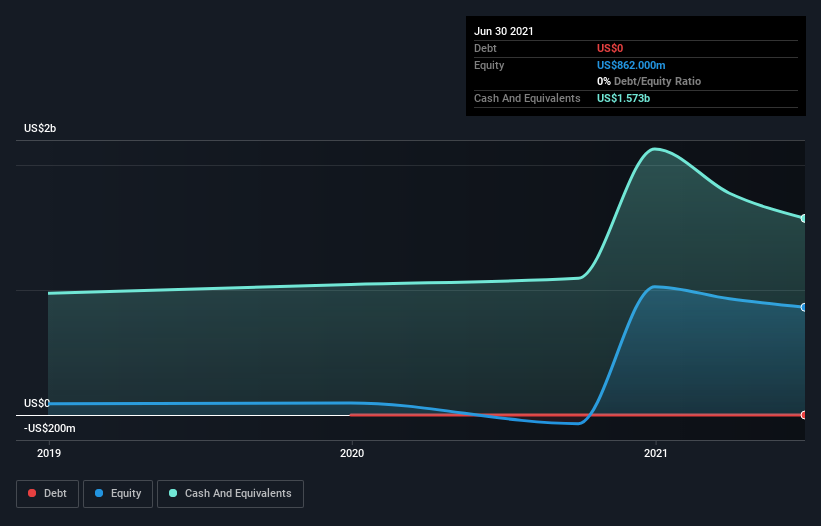- United States
- /
- General Merchandise and Department Stores
- /
- NasdaqGS:LOGC
We're Keeping An Eye On ContextLogic's (NASDAQ:WISH) Cash Burn Rate

There's no doubt that money can be made by owning shares of unprofitable businesses. For example, although Amazon.com made losses for many years after listing, if you had bought and held the shares since 1999, you would have made a fortune. But while the successes are well known, investors should not ignore the very many unprofitable companies that simply burn through all their cash and collapse.
So, the natural question for ContextLogic (NASDAQ:WISH) shareholders is whether they should be concerned by its rate of cash burn. In this report, we will consider the company's annual negative free cash flow, henceforth referring to it as the 'cash burn'. Let's start with an examination of the business' cash, relative to its cash burn.
Check out our latest analysis for ContextLogic
When Might ContextLogic Run Out Of Money?
A company's cash runway is calculated by dividing its cash hoard by its cash burn. In June 2021, ContextLogic had US$1.6b in cash, and was debt-free. Importantly, its cash burn was US$1.1b over the trailing twelve months. That means it had a cash runway of around 18 months as of June 2021. Importantly, analysts think that ContextLogic will reach cashflow breakeven in 2 years. Essentially, that means the company will either reduce its cash burn, or else require more cash. You can see how its cash balance has changed over time in the image below.

How Well Is ContextLogic Growing?
It was quite stunning to see that ContextLogic increased its cash burn by 4,591% over the last year. On the bright side, at least operating revenue was up 22% over the same period, giving some cause for hope. Taken together, we think these growth metrics are a little worrying. Clearly, however, the crucial factor is whether the company will grow its business going forward. For that reason, it makes a lot of sense to take a look at our analyst forecasts for the company.
How Easily Can ContextLogic Raise Cash?
Given the trajectory of ContextLogic's cash burn, many investors will already be thinking about how it might raise more cash in the future. Generally speaking, a listed business can raise new cash through issuing shares or taking on debt. Many companies end up issuing new shares to fund future growth. We can compare a company's cash burn to its market capitalisation to get a sense for how many new shares a company would have to issue to fund one year's operations.
ContextLogic's cash burn of US$1.1b is about 30% of its US$3.5b market capitalisation. That's not insignificant, and if the company had to sell enough shares to fund another year's growth at the current share price, you'd likely witness fairly costly dilution.
How Risky Is ContextLogic's Cash Burn Situation?
Even though its increasing cash burn makes us a little nervous, we are compelled to mention that we thought ContextLogic's revenue growth was relatively promising. One real positive is that analysts are forecasting that the company will reach breakeven. We don't think its cash burn is particularly problematic, but after considering the range of factors in this article, we do think shareholders should be monitoring how it changes over time. Taking an in-depth view of risks, we've identified 3 warning signs for ContextLogic that you should be aware of before investing.
Of course, you might find a fantastic investment by looking elsewhere. So take a peek at this free list of companies insiders are buying, and this list of stocks growth stocks (according to analyst forecasts)
New: AI Stock Screener & Alerts
Our new AI Stock Screener scans the market every day to uncover opportunities.
• Dividend Powerhouses (3%+ Yield)
• Undervalued Small Caps with Insider Buying
• High growth Tech and AI Companies
Or build your own from over 50 metrics.
This article by Simply Wall St is general in nature. We provide commentary based on historical data and analyst forecasts only using an unbiased methodology and our articles are not intended to be financial advice. It does not constitute a recommendation to buy or sell any stock, and does not take account of your objectives, or your financial situation. We aim to bring you long-term focused analysis driven by fundamental data. Note that our analysis may not factor in the latest price-sensitive company announcements or qualitative material. Simply Wall St has no position in any stocks mentioned.
Have feedback on this article? Concerned about the content? Get in touch with us directly. Alternatively, email editorial-team (at) simplywallst.com.
About NasdaqGS:LOGC
Flawless balance sheet minimal.
Similar Companies
Market Insights
Community Narratives



